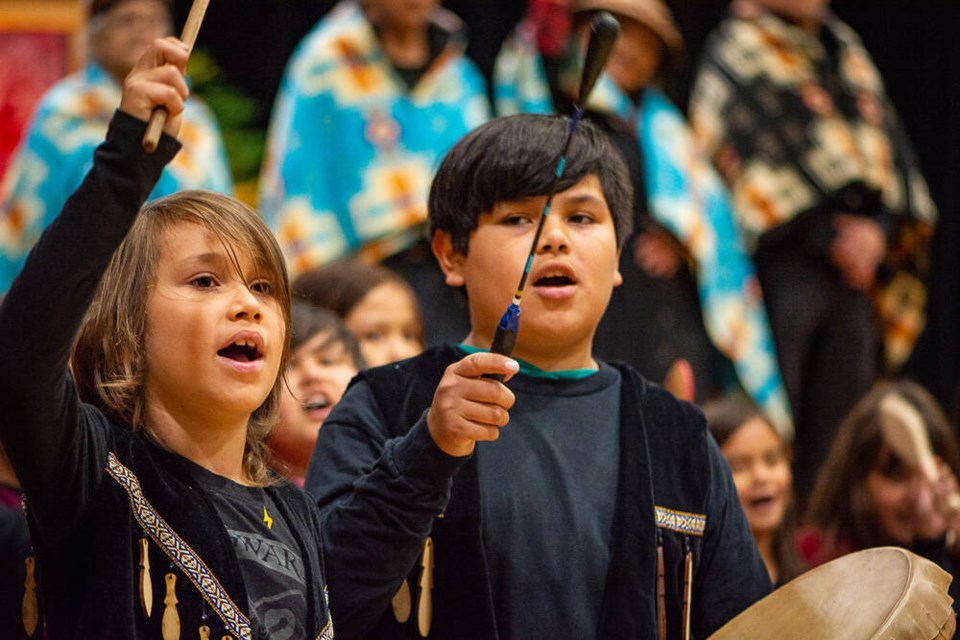Education policy in Canada was once involved in the active removal of First Nations culture and language from young students across the country. Now, the power to decide how Indigenous children are taught in schools is being formally handed back to their communities.
On Monday, representatives from the Squamish Nation (Sḵwx̱wú7mesh Úxwumixw), Tsq’escenemc (Canim Lake Band) and Ditidaht First Nation gathered at the Chief Joe Mathias Centre on Xwmélch’sten (Capilano 5 Reserve) to celebrate the Nations assuming authority over their own education systems on their lands. All three Nations finalized agreements with the federal government over the past few months.
Those Indigenous governments join the ʔaq’am, Cowichan Tribes, Lil’wat Nation and Seabird Island, which were the first cohort of participating First Nations in B.C. to sign education jurisdiction agreements last year.
With a history of colonialism that has minimized or taken away so much, to reclaim and revitalize that culture in classrooms today means so much, said Sxwixwtn (Wilson Williams), elected councillor and spokesperson for Squamish Nation.
“The road that’s being paved now is providing not only hope for our people, it’s providing that strength, stability and empowerment, that not only myself as a proud father, but as an Indigenous leader for the Nation, to help move us forward and help us strengthen what we are connected to, to who we are and where we come from,” he said.
Part of the Indigenization of school curricula incorporates storytelling and ceremony in the classroom. “In the mornings at school, we do a morning ceremony, share a song, and the kids are able to share the language and grasp it,” Williams said.
This next step in educational autonomy builds on the work to provide First Nations-specific education to students, which has expanded significantly in recent years. For example, the Squamish Nation offers language learning opportunities starting at kindergarten – through Xwmélch’sten Etsímxwawtxw Skwul (Capilano Littlest Ones) and Norgate Xwmélch’sten Community Elementary – all the way through high school, which includes the Sp’áḵw’us Skwúlaw̓txw program at Carson Graham Secondary. Squamish Nation is also in the process of opening its Language Nest program, which will teach the language to children three and younger.
'I couldn’t imagine myself doing that': councillor's daughter introduces Coldplay in Squamish language
“It’s not just with us, as a Nation – we’ve been working with governments, municipalities, the city, school districts,” Wilson said. “They’re very open. Maybe five or 10 years ago, it wasn’t that way. They want to hear from us. We’ve been in spaces where we’re sitting down and discussing these things … what an inaugural curriculum would look like.”
Wilson’s own kids have grown up going to school on the North Shore, at times asking him when they would get to learn the language because they hadn’t taken a class before.
“Now they’re in high school learning the language right from Grade 8 to 12,” he said. “My daughter just spoke at the Coldplay concert Friday night in the language, welcoming everyone there and introducing the band.
“I couldn’t imagine myself doing that at that age,” Wilson said.
Monday’s ceremony included a procession of drummers and students from the Squamish Nation, followed by words from education officials representing the First Nations, the province and the federal government.
Among the speakers were B.C. Minister of Education and Child Care Rachna Singh, and Angela Bates from Crown-Indigenous Relations and Northern Affairs Canada.
The federal government has a lot to do to earn the trust of Indigenous Peoples, Bates said.
“A vital part of that is giving back administration and management over areas that should be in the jurisdiction of First Nations,” she said. “These educational jurisdiction agreements are one of the many paths on the journey to reconciliation. They help create a better future for all of us.
“Improving educational outcomes for Indigenous people through these agreements is an important step on this path and I look forward to seeing First Nations in British Columbia thrive once they take back control over education,” Bates said.




